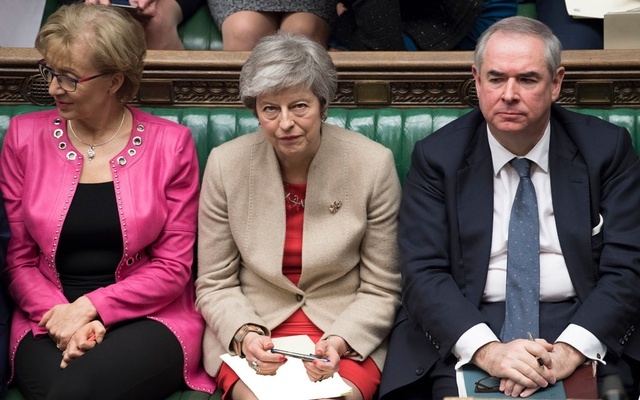May offers MPs second referendum vote

Prime Minister Theresa May of Britain on Tuesday dangled before lawmakers the prospect of a second referendum on Brexit, in a last-ditch effort to win over those who have rejected her three previous efforts to extract Britain from the European Union.
In a speech in London, May outlined what she called a “new Brexit deal,” which would give Parliament a broader role in shaping her Brexit plan. But most attention focused on her offer to have lawmakers vote on whether to have a second referendum, something she had previously ruled out.
May described the deal as “one last chance” to deliver on the 2016 referendum vote to leave the European Union.
If lawmakers reject it again, she said, “they are voting to stop Brexit.” She added, “If they do so, the consequences could hardly be greater.”
Early reaction among Conservatives and Labour was not encouraging.
The Labour leader, Jeremy Corbyn, said his party would not support the plan, calling it a “rehash of what was discussed before.” Pro-Brexit Conservatives reacted angrily as well, with Jacob Rees-Mogg, a lawmaker and leader of that faction, dismissing it as “worse than before.”
On the referendum, it was unclear how much of a concession May was making. That is because she was offering lawmakers a chance to vote on whether to have a referendum, rather than supporting one herself. And she was vague about what question or questions any referendum would pose.
Her new deal seemed designed to entice pro-Brexit Labour Party lawmakers to support her Brexit blueprint. It includes the opportunity for Parliament to decide on whether to keep a type of customs union with Brussels, eliminating tariffs and reducing checks on goods at frontiers — a demand of Corbyn.
But in moving somewhat closer to Labour’s position, she risked losing Conservative supporters of her plan.
Nor was she guaranteeing any new consensus on sensitive issues. Parliament has previously voted against a second referendum and May said she still opposed the idea, making it unlikely there would be sufficient support for it this time. Nor has Parliament yet managed to coalesce around any plan to stay in a customs union with the bloc.
The vote on legislation to leave the bloc, known as the Withdrawal Agreement Bill, is scheduled for the week beginning June 3. It is likely to be the final significant act of May’s tenure, as she has promised to set a date for her departure after the decision, ending almost three troubled years in power.
May’s latest Brexit deal differs from her previous one in that it offers Labour lawmakers more assurances on European standards on workplace protections and environmental rights.
She would also allow Parliament the right to demand, at least temporarily, a type of customs union with the bloc that is designed to prevent tariffs and many border checks on industrial goods, but only until the next general election, scheduled for 2022. And she is also offering the opportunity to vote on the second referendum.
For Conservative Brexit supporters, the bill has some sweeteners in that it commits the government to working on technical measures to track goods that would prevent the need for border checks at the Irish border.
Critically, however, this would not guarantee Britain staying out of the so-called Irish backstop, a device to avoid a hard border with Ireland. The backstop would keep the whole of the United Kingdom tied to Europe’s customs rules indefinitely, outraging Brexit supporters who say it defeats the whole purpose of Brexit.
On Tuesday, there was a backlash from hard-line pro-Brexit Conservative lawmakers, including Iain Duncan Smith, a former party leader.
“The backstop is still there, it’s a customs union in all but name and it puts Brussels firmly in control of our destiny,” he said in a statement, adding that there was “nothing new or bold about this bad buffet of non-Brexit options.”
On Tuesday May at least secured support from her fractured Cabinet for her plan, no mean feat in itself. Yet, in Parliament, the math does not appear to have changed for May — at least not for the better.
Her Conservatives are braced for a humiliating defeat in European elections this week, confronted by the challenge of the Brexit Party, led by Nigel Farage, who wants Britain to leave the European Union fast, without any deal if necessary.
Several of those vying to succeed May are already arguing the same hard Brexit line. As a result, several hard-line pro-Brexit supporters within May’s Conservative Party, who reluctantly supported the last of her three efforts to get the plan through Parliament, are indicating they will revert to their earlier hostility.
Mark Francois, a prominent member of the hard-line Brexit faction, told the BBC that the opposition to May’s deal was “going up, not down.”
“Unless she is rescued by a Marxist,” said Francois, referring to Corbyn, “the Withdrawal Agreement Bill is dead on arrival.”
